GamePlan: Our Annual List of Future NFL General Managers
Here’s a memorable story from the offseason, though the player and general manager involved will remain nameless.
The player was wrapping up his honeymoon on St. Lucia, and readying to head back to the States, when volcanic eruptions began on the island. Quickly, those there were warned that much bigger eruptions could come, and to take all precautions to stay safe. One problem: All outgoing flights were grounded, the island’s airspace was closed and pretty much the only way to leave would be if you had your own boat.
Soon thereafter, the GM was apprised of the situation. So in an instant, he went from his predraft work into crisis mode. He worked to see if there was a way to get a boat to the player and his new wife and got the team’s security force on the case.
There’d be no boat. But the team did find the player safe shelter to ride the situation out.
Suffice it to say, Kevin Costner definitely didn’t deal with anything like that in Draft Day.
The job of general manager in the NFL is changing. It’s growing. It’s becoming more challenging. And thus, what a team is looking for in one has had to evolve, too.
In this week’s column, we’ll present to you our 13th annual future GMs list. It is, to be sure, a challenging exercise to pull off every year. Aspiring young GMs usually can’t point to one thing or another, the way an offensive coordinator can cite a quarterback’s development, or a defensive coordinator can send a team his unit’s key metrics, as a reason why they should be the next guy to land one of 32 coveted spots running a team.
Scouting roles, and roles in personnel in general, are normally too vague for any facts or figures to be blindly reliable—a person who holds a title in one place might have a vastly different job than a person holding the same title in another place—so sorting through a mountain of names to be considered usually requires a whole lot more digging. And it’s getting even harder as NFL organizations continue to add new departments and staff.
But one thing that’s abundantly clear is that NFL hiring into these positions could soon be counterintuitive to the conventional idea of who GMs are and what they do. The eruption in St. Lucia’s just one example of why Costner’s caricature of the role might not hold up much longer.
It’s Week 17, and we’ve got plenty to get to in the GamePlan column. This week, you’ll get …
• A look at the biggest games of the weekend, starting with an intriguing QB showdown.
• Story lines to follow, with an assessment of the top pick’s value in 2022 draft.
• My flawless (since Thanksgiving) gambling advice.
• A potential COVID-19 twist to what’s left of the 2022 season.
But we’re starting with the evolving role of the NFL general manager, and a couple lists of folks who could ascend into those roles.
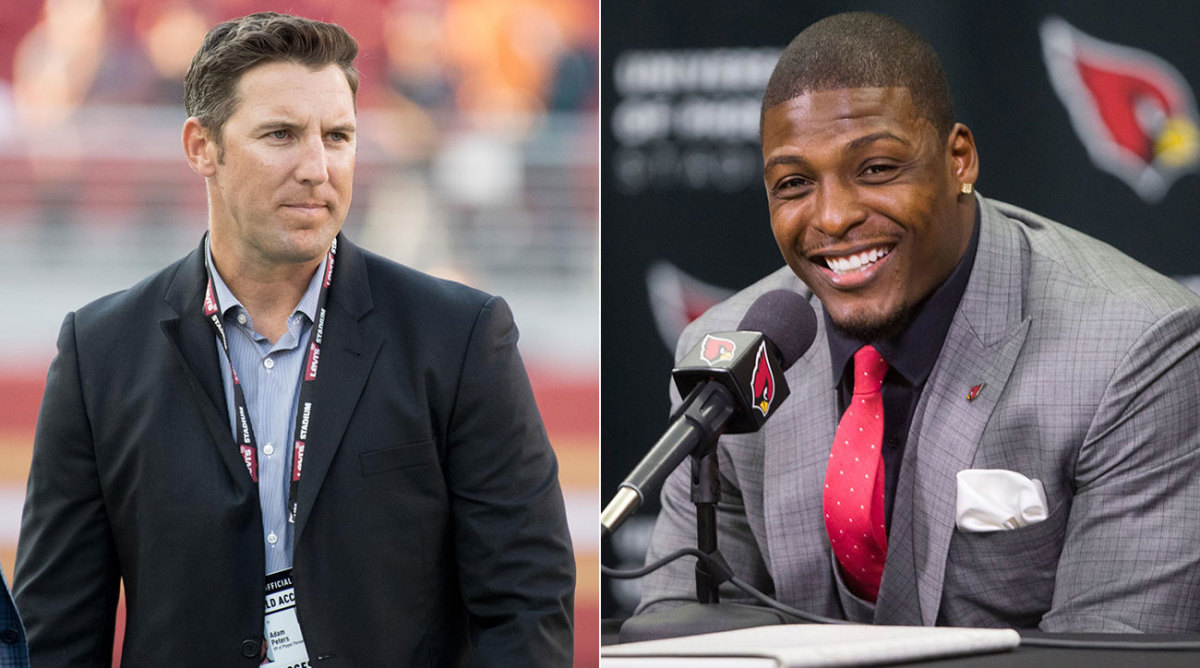
I was talking to a team executive on Thursday, one who’s hired a GM, about the idea of finding a scout for that job, versus getting someone from the football operations side, and eventually we got to what specifically he’d look for in a candidate. His prerequisites might be a little different than you’d expect.
1) An ability to hire staff.
2) An ability to work productively with the head coach.
3) An ability to manage people.
You might notice there’s nothing in there about finding a quarterback, maximizing a third-round pick or building out depth in your secondary. There also isn’t anything about managing the cap or implementing analytics. Why? Well, you can find people to do all of those things. And it’s great if the GM can check off a couple of those boxes themself. But ultimately, they’re going to need help, and that takes finding and deploying good people effectively.
“To me, it’s about how you build the best and most cohesive organization,” said the exec. “Picking players is a huge part of it, but so is working with the coach, and managing trainers and equipment managers, all of that. The more complex that job gets, you get to the point where it might actually be easier to find people who are good at choosing talent but don’t have the rest of the skill set to fill a director or VP type of role.
“You can go either way.”
And while scouts used to rail against that idea, even guys rooted in that side of the business who have ascended to GM roles agree: The job isn’t even close to being the same as the ones they held in climbing the ladder through personnel departments.
“You are the general manager—you can take that literally,” said one such NFC GM. “The job is broad, and so you have to be able to hire people that offset your own weaknesses. It’s not even necessarily a football job all the time. I deal with HR, I deal with contracts, I deal with things I’ve never had to deal with in my life. So no matter how well-trained you are, and obviously the more you’ve been exposed to, the better, you’re going be learning on the run.
“That’s why you need good people. You need good logistics people. You need a good cap guy. You’re responsible for a lot. … The idea of the GM being a guy who shuts his door and watches tape, that’s fading. Organizations are getting too big. There’s too much information coming in.”
It’s at the point now where, this GM said, he has to carve out time into his days to make sure he does get some of what he was hired for (which actually was finding players) in amid everything else—so he’ll try to get some pro tape done in the morning on Wednesdays, Thursdays and Fridays, and look at college guys in the afternoons.
Another NFC GM told me he shoots to study 12 to 15 players a week (mostly college guys) on tape, just so he can accumulate a working knowledge to be effective with his scouts when the offseason arrives. His initial goal was actually to get three guys in per day in-season (which works out to 18 per week, with game day obviously excluded from the equation), but the volume of nonscouting things that cross his desk made that impossible.
“The GM manages personnel, cap, training room, video, equipment, security, analytics and player engagement,” the GM said. “And he has to hire those people [to run those departments] and then balance all those opinions.”
And ultimately, as the job has grown, so has the importance of a GM’s ability to synthesize what can seem like an endless well of information, then make decisions off it.
Those decisions can encompass everything from deciding how the weight room should be set up, to budgeting for sports science, to incorporating analytics into football decisions and, yes, ultimately to whom you might take with your first-round pick.
“The learning curve is tough because of the breadth of responsibilities that come across your plate, and how integrated everything has to be for an organization to have success,” said one AFC GM. “You can take a player you’re gonna acquire, it starts with college scouts, the area scouts’ information, their strengths and weaknesses; then it goes to the coaching staff, with personnel group’s input, in how they land in your scheme, then to your research group on how they should be valued; and your doctors, trainers on the medical.
“And then the GM executes the acquisition. And you get him, and now he’s in the building, and you hand him off to your coaches, player development people and support staff, and now they’re running the show.”
The GM then explained how, after that, there’s how a player’s life skills play into how he winds up playing, and how coaching gets him to game day, and then years later, if things go well, it can swing back to the personnel department to make decisions on giving a guy a contract, or maybe eventually trading him, or letting him go with an eye on comp picks.
And that’d just be a decision on a single player. Such decisions need to be made away from the actual 53-man roster too (coaching contracts, allocating resources, etc., etc.).
If your head is spinning at all this, then you get the idea.
“I don’t know how just scouting the Southeast would have you ready for the job,” said the second NFC GM. “There’s a lot that goes into it.”
So with that in mind, we’re going to give you our 13th annual future GMs list. And in the spirit of the column, we’re breaking it up—with one category stocked with scouting folks, and then a handful of operations people to follow.
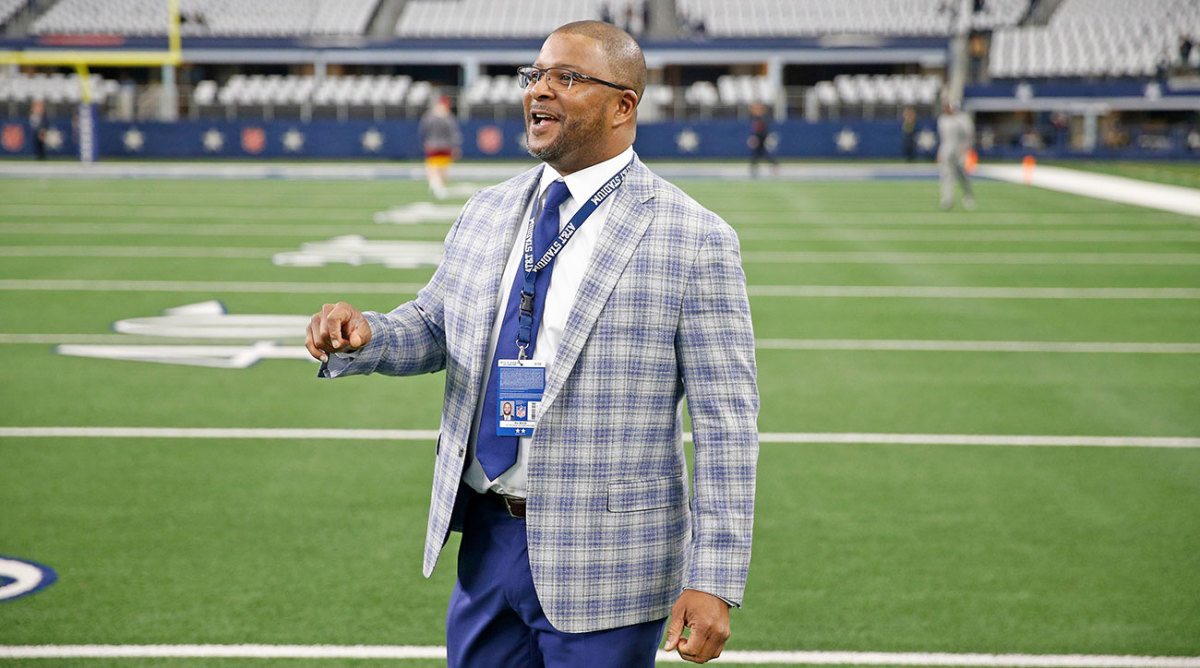
SCOUTING SIDE CANDIDATES
Mike Borgonzi, Chiefs assistant GM: Originally brought aboard by ex-Kansas City GM Scott Pioli, Borgonzi steadily rose through the organization, then was held over by Andy Reid and John Dorsey. Under Pioli, the Brown alum got experience on the ops side, served as the team’s pro scouting director, and as Brett Veach’s No. 2 has more recently been involved on the college side, too.
Brandon Brown, Eagles director of player personnel: Part of Howie Roseman’s robust scouting department, Brown’s primary experience is in pro scouting. But he’s done more with the draft over the last year, and has a really interesting background, with a law degree and a job in college football compliance giving him a good ability to see the big picture organizationally.
Morocco Brown, Colts college scouting director: A decade ago, Brown was seen as riser in the field, having ascended to pro director in Washington, before Ray Farmer hired him in Cleveland to be Farmer’s No. 2. Unfortunately for Brown, Farmer only lasted two years in that job, and Brown had to reset thereafter. Since, he’s reemerged as a vital piece of Chris Ballard’s staff in Indy—and as the lead guy on the college side, giving him experience having directed both a pro and college department.
Ran Carthon, 49ers director of player personnel: Carthon played in the NFL, came up under Thomas Dimitroff in Atlanta, and Les Snead with the Rams, and arrived in San Francisco as pro director, and has moved up a rung and added college scouting experience to his résumé. The son of ex-NFL player and coach Maurice Carthon, he’s also well-connected in the Parcells coaching/scouting family.
Ryan Cowden, Titans VP of player personnel: Cowden worked under Marty Hurney and Dave Gettleman in Carolina, and now have five years of experience working in GM Jon Robinson’s Patriot-centric scouting system. He’s worked extensively on both the college and pro sides, and interviewed for the Washington GM job last year, with ex-Panthers coach Ron Rivera.
Glenn Cook, Browns VP of player personnel: A former Univ. of Miami linebacker and captain, Cook’s young, but has accumulated a pretty interesting résumé, having coached before getting into scouting, and having worked in personnel departments for Ted Thompson and Bill Polian, before landing in Cleveland, and rising through the ranks under Sashi Brown, John Dorsey and now Andrew Berry.
Ian Cunningham, Eagles director of player personnel: A protégé of Ozzie Newsome’s—one of his early jobs was as the Southeast area scout for the Ravens (Newsome’s alma mater, Alabama, was one of his schools)—Cunningham drew interest for an assistant GM post in Carolina last year, and Joe Douglas tried to take him to the Jets with him in 2019, and again in ’20. Cunningham’s time is coming, even if may still be a few years away.
Ed Dodds, Colts assistant GM: Long seen as one of the NFL’s premier evaluators, Dodds was seen as a secret weapon of Seattle GM John Schneider’s, before Ballard swiped him from the Seahawks upon arriving in Indy. Since then, he’s become Ballard’s right-hand man as the Colts have built one of the NFL’s most talented rosters. Dodds interviewed with the Panthers and Lions last year, and was very high on Robert Saleh’s list of potential GMs had Saleh not landed in a place with a sitting GM.
Joe Hortiz, Ravens director of player personnel: The Ravens’ longtime college scouting director moved into Eric DeCosta’s old role when DeCosta replaced a retiring Newsome, and still runs the draft while serving in a more comprehensive capacity. Given how Baltimore has continued to be innovative and forward-thinking as an organization, on just about every front, Hortiz should be well-positioned to get his shot soon.
Brandon Hunt, Steelers pro scouting director: Hunt’s another Steelers personnel man to work through the ranks, and he could be in line to take another step forward if GM Kevin Colbert retires after the draft. He’s worked on both the pro and college side, and the team’s pro department has shined over the last few years, with the team more active in seeking veteran additions (Minkah Fitzpatrick, Joe Haden, etc.).
Jeff Ireland, Saints assistant GM: Ireland’s draft record since landing in New Orleans has been incredible—since knocking it out of the park in 2016 and ’17 on draft day, the Saints have consistently fielded one of the NFL’s most talented rosters. The ex-Dolphins GM interviewed for the Detroit and Carolina openings last year, and is very well-connected in the sport.
Will McClay, Cowboys VP of player personnel: The question isn’t whether McClay could land a job, it’s whether he’ll want to go—he’s the top personnel man in the Cowboys’ organization, he’s rooted in Texas and the Jones family loves and takes good care of him. And for good reason—McClay’s helped Dallas consistently field outstanding rosters, and has experience not just in scouting but also coaching and analytics. (There’s a big part of me that believes he’s exactly what the Giants need.)
Dan Morgan, Panthers assistant GM: Morgan’s name should sound familiar. But the ex-Panthers linebacker isn’t just a former player—he very much paid his dues working his way up in the Seattle pro scouting department during the Legion of Boom years, before going to Buffalo as a key piece of the Bills’ rebuild. He’s been in Carolina since May, helping lead Scott Fitterer’s strong department, which included a couple of guys, in VP Pat Stewart and lead negotiator Samir Suleiman, who were also considered for the GM job in Charlotte.
Monti Ossenfort, Titans director of player personnel: Ossenfort succeeded Robinson as Patriots college scouting director nearly a decade ago, then followed him to Nashville, and in doing so has diversified his portfolio. He was a finalist for the Panthers’ GM job last year, and his New England–based connection to Giants coach Joe Judge (the two have a good relationship) could put him in contention for the Giants job next month.
Adam Peters, 49ers assistant GM: Peters was another finalist for the Carolina job last year, and has worked for John Elway in Denver and Bill Belichick in New England. He originally went to Denver with Josh McDaniels in 2009, which could be something to keep in mind should McDaniels land a job somewhere.
Ryan Poles, Chiefs executive director of player personnel: One of the fastest risers on the board, the former Boston College star lineman—he was Matt Ryan’s left guard there—has grown to become an integral part of Veach’s department in Kansas City. He was a surprise candidate in Carolina last year, and wound up becoming a finalist. Poles came up on the college side, but works with Veach and Borgonzi in a broad role now.
Joe Schoen, Bills assistant GM: Schoen is as highly-regarded as anyone on this list. The Panthers and Falcons interviewed him last year and, based on the Bills’ success, he’s likely to be in the mix for any job that comes open this year. He’s worked in Carolina and Miami, and has experience in every facet of the personnel work—and has helped to guide a really strong department that has rising stars like pro director Malik Boyd and assistant DPP Terrance Gray in it.
John Spytek, Buccaneers VP of player personnel: Spytek replaced Robinson in Tampa Bay, and has been integral to building the Bucs into champion alongside Jason Licht for the last six years. Before that, he worked on the college scouting side in Denver, winning a Super Bowl there, and started in his career in a loaded personnel department under Andy Reid in Philly.
Jon-Eric Sullivan, Packers director of player personnel: A newcomer to the list! Sullivan’s name came up a bunch when I called around the last couple of weeks. Brian Gutekunst has Sullivan captaining the personnel department, and his background is very similar to that of the GM—he worked his way to become a Southeast area scout for the Packers, before becoming Green Bay’s college scouting director. Sullivan’s one of a number of young guys to watch in that department (pro director Richmond Williams is another).
Duke Tobin, Bengals director of player personnel: Tobin is, in many ways, already a GM. Could someone pry him from the Bengals? It doesn’t seem likely, but there’d be reason for interest. Tobin was a hot name a few years back, credited with building Cincinnati’s playoff teams from 2011 to ’15, and he’s since got through a teardown and built the team back up to a point where it sure looks like Cincinnati has a chance to be very good for a while again.
Adrian Wilson, Cardinals VP of pro scouting: You remember Wilson as the enforcer in the secondary for some excellent Cardinals teams more than a decade ago. But since then? He’s become Arizona GM Steve Keim’s right-hand man, so he brings scouting expertise, and the sort of player credibility John Lynch has, to the table. The Cards’ personnel department—which has other strong names for the future like Quentin Harris and Dru Grigson—has done a very nice job in rebuilding what was a really shaky roster a few years back.
Eliot Wolf, Patriots scouting consultant: The son of the legendary Ron Wolf is back on the list, and deservedly so. Wolf was runner-up for the Packers’ job in 2018, when Gutekunst was elevated, after being a cornerstone for the Green Bay scouting department for years. He then left for Cleveland, where he was Dorsey’s assistant GM, before those guys were blown out after the ’19 season. And in New England? He’s been invaluable, helping the Patriots change their scouting setup last year, by bringing a strong outside perspective.
Dave Ziegler, Patriots director of player personnel: And Wolf has worked closely with Ziegler, who’s moved into Nick Caserio’s old role. In his first offseason in charge, the new DPP crushed it, landing an incredibly promising rookie class (Mac Jones, Christian Barmore, Rhamondre Stevenson) and a bumper crop of free agents (Matthew Judon, Hunter Henry, Kendrick Bourne, etc.) to energize what was a flagging roster. He would’ve been McDaniels’s GM in Cleveland, had McDaniels landed the Browns job.
OPERATIONS SIDE CANDIDATES
Kwesi Adofo-Mensah, Browns VP of football operations: A lot of smart people in the NFL have bought up stock in Adofo-Mensah—a strong personality who’s brilliant in helping a team pull every lever and set up a smart process. And whereas player evaluation may have once created a gap in his résumé, Adofo-Mensah has been on school calls and done tape work since landing in Cleveland. It feels like it’s not if, but when with him. The Panthers interviewed him last year, and owner David Tepper was intrigued by the idea of hiring him.
Chad Brinker, Packers personnel/football administration executive: The 41-year-old played at Ohio Univ. and was good enough to get into camp with the Jets, before embarking on a career in pharmaceutical sales. He found his way back to football with the Packers 12 years ago and has been a jack of all trades since, while playing a big role in modernizing the Packers’ old-school scouting operation. He also recently got his MBA from Northwestern, so the 41-year-old touches a lot of bases from a résumé standpoint.
Mike Greenberg, Buccaneers VP of football administration: One of the most respected contract negotiators in the sport, Greenberg has become one of Licht’s most trusted confidants—and he more or less frees Licht to be an evaluator because he’s fully capable of running everything else. Tampa’s ability to keep the team together this offseason was in no small part thanks to how Greenberg set up the team’s cap; the Bucs had budgeted incredibly responsibly over the years, which allowed for them to stretch things this year.
Omar Khan, Steelers VP of football and business administration: He first appeared on this list when he was seen as the presumed GM for Bill Cowher whenever Cowher returned to coaching. Cowher, of course, never did, so Khan has stuck in Pittsburgh as a trusted lieutenant of the Rooney family. The Texans took a hard look at him during their GM search last year, and he’d certainly be in line for more responsibility in Pittsburgh if Colbert retires.
Tony Pastoors, Rams VP of football and business administration: The question with Pastoors, as it has been with Greenberg and Khan, is whether he’s on a GM track or a team president track. Either way, the ex-Dartmouth football player has a bright future. He’s responsible for the team’s salary cap, but really is in on every part of the team’s football operations, working closely with team COO Kevin Demoff.
Catherine Raîche, Eagles vice president of football operations: She’s just 32, and maybe a couple of years away, but she’s now in Berry’s old role in Philly, and Berry tried to take her to Cleveland with him. She has a law degree, ran contracts for the Toronto Argonauts, then became the Argos’ assistant GM and, for good measure, is fluent in three languages. And according to those who’ve worked with her, she’s capable in all facets of personnel. One ex-colleague of hers plainly said, “She will be the first female GM.”
So that’s a lot of names to digest, of course, and hopefully it gives you an idea of how complicated this can be, and also some insight into the challenge of filling these roles.
One last thing: There are good people who just missed this list, in large part because their teams are in a downturn, or their bosses are on shaky ground, and thus it’s unlikely they’ll get hired. To me, that’s just the fair way to do it. Also, at some point, I had to find ways to keep the list at a manageable number.
And I’ll be the first to tell you, doing the list annually, that this is a very inexact science.
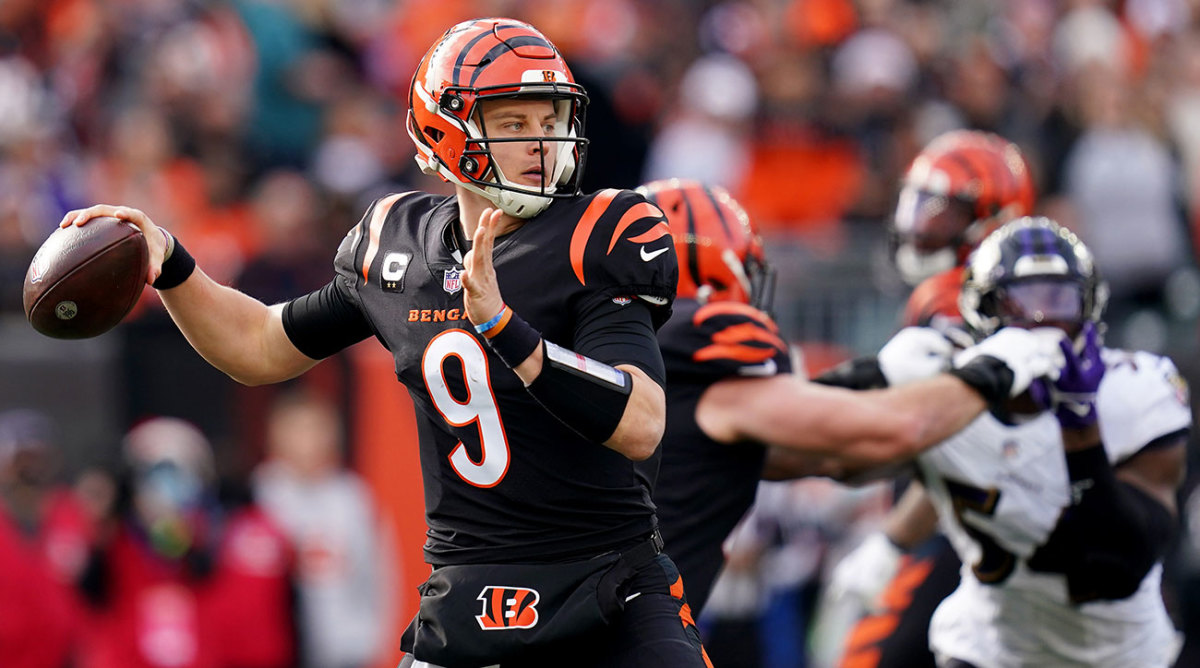
FIVE STAR MATCHUPS
1) Chiefs at Bengals (Sunday, 1 p.m. ET): This one’s going to be all kinds of fun—and I think it’ll give Joe Burrow a chance to slide into the MVP conversation. He’s 77-of-102 for 1,030 yards, seven touchdowns and no picks (129.9 rating) in his last three games, and Cincinnati’s all alone in first in the AFC North. And the Bengals have two big games left that’ll give Burrow a chance to steal the spotlight. So there’ll be that on Sunday, and the Chiefs’ morphing back into the AFC’s death star. (Kansas City has a lot on the line, too, with the Titans lurking a game back and holding the tiebreaker over Andy Reid’s crew.)
2) Cardinals at Cowboys (Sunday, 4:25 p.m. ET): If the Packers lose once and the NFC’s three 11–4 teams win out, Dallas, by virtue of having only one conference loss, would get a first-round bye and home field advantage through the conference’s playoffs. Considering that the alternative might be going to Lambeau (we don’t need to review Dallas’s playoff history there), the NFC East champs have a shot to really improve their place in the playoff picture. And while Arizona’s clinched a playoff spot too, there’s very little question that the Cardinals need to turn the momentum of the last few weeks—momentum that’s dredged up old questions about Kliff Kingsbury and Kyler Murray.
3) Rams at Ravens (Sunday, 1 p.m. ET): It sure looks like Matthew Stafford, Cooper Kupp & Co. have found their stride. And they’ve answered questions on their toughness with a physical edge running behind surprise bell cow Sony Michel, who went for 423 yards and two touchdowns on 89 carries in four December games. But this one will be a challenge, no question, with the game on the other side of the country and Lamar Jackson back to pilot a reeling, but proud Ravens team that’s running out of wiggle room in the AFC playoff chase.
4) Dolphins at Titans (Sunday, 1 p.m. ET): It’s fair to ask questions about how much Miami’s seven-game winning streak means, given the list of opponents the Dolphins have run through, while acknowledging that it’s mighty impressive, under any circumstances, for any NFL team to go from 1–7 to 8–7. This week, they’ll get their biggest test probably since beating the Ravens on Veterans Day. And the Titans are positioned right now to be the No. 2 seed, and are one Chiefs slip up from being the No. 1 seed, with A.J. Brown back in the saddle and Derrick Henry’s return on the horizon.
5) Broncos at Chargers (Sunday, 4:05 p.m. ET): Since its Week 7 bye, Los Angeles has gone loss, win, loss, win, loss, win, win, loss, loss. And yet, everything is still right there in front of the Chargers, at 8–7, with games against the Broncos and Raiders left on the schedule. It’ll be interesting, too, to see how Justin Herbert rebounds from what has to be considered the worst loss of his career. Meanwhile, I’d say, at this point, Denver’s around 50/50 on making a coaching change, so certainly there’s meaning here for the Broncos beyond just their now faint playoff hopes.
Watch NFL games online all season long with fuboTV: Start with a 7-day free trial!
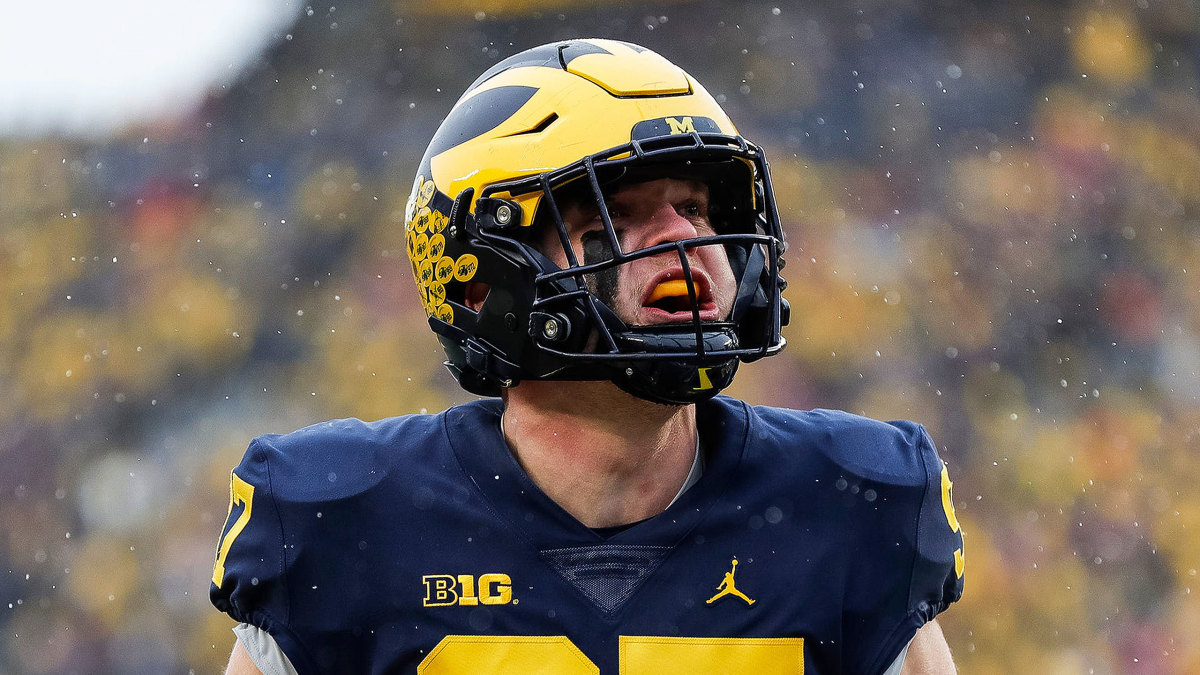
FOUR THINGS TO FOLLOW
The value of the top picks in 2022. If the Jaguars and Lions lose this weekend—Jacksonville’s at New England and Detroit’s in Seattle (for what might be Russell Wilson’s final home game with the Seahawks)—they’ll be locked into the top two picks, in some order. And so the obvious next question is what the value of those picks is this year. Truth is, this probably won’t be the best year to be in that position. The leaders in the clubhouse to go No. 1 and 2 in the draft, in my opinion, are pass rushers Aidan Hutchinson of Michigan and Kayvon Thibodeaux of Oregon. I’d bet Hutchinson, at this point has the edge with most teams, because he’s bigger and more complete. But neither guy is seen as quite in the neighborhood of a Myles Garrett, Jadeveon Clowney or Chase Young coming out. So you’re getting a really good, and potentially great, player, just not one with the athletic ceiling of others at that position whom we’ve seen go that high. The other thing that hurts this year? There’s no quarterback, at this point, deemed worthy of going first overall, which kills the pick’s trade value. To be clear, of course, the Lions and Jags will be happy to use those picks, and Hutchinson and Thibodeaux could become cornerstones for really good teams. It’s just that picking there won’t be the same as it has been in other years.
Is Monday night a page-turner in Pittsburgh? On Thursday, Steelers quarterback Ben Roethlisberger conceded that, while he didn’t want to speak in absolutes, the Browns game this week could well be his final home game. There are also questions surrounding the future of GM Kevin Colbert, so Monday night’s game could have a little bit of a last-stand feel for a 7-7-1 team that hasn’t had a losing record since the year before Roethlisberger was drafted in 2004. And oh, by the way, the game itself is pivotal in the races for both AFC wild cards and the North division title. All of that, plus a rival’s being in the house, should make for a pretty great environment at Heinz Field.
Could players coming back be the story line of the next few weeks? Between now and the playoffs, the Packers could get back the best left tackle in football (David Bakhtiari) and their two best defensive players (Za’Darius Smith, Jaire Alexander). The Rams are getting Cam Akers back. The Titans are optimistic that Henry will be back soon. The Bucs are looking to have Shaq Barrett and Mike Evans back at full speed later in January, and we’ll see on Leonard Fournette. Add it up, and I really can’t remember a year when there were more teams trying to hold on with backups at certain positions, to try to buy time for stars to make it back into the lineup. And in the background is that fact that this is the first 17-game regular season, which has caused some teams to be more cautious with players’ workloads in general. This story line promises to be a big one for the next month, and with each game the aforementioned teams win without the aforementioned players.
Can the Bills build on their big win? On Monday, I wrote about the Bills’ adjusting to life as the team on top of the mountain, rather than the one climbing it. One key part of that, as coach Sean McDermott would tell you, is finding a way to keep steady regardless of the perceived magnitude of the game. The Bills are coming off a massive win. The final was 33–21 in Foxboro, but the reality is Buffalo played well enough to beat New England by three touchdowns. So now that we’ve seen the Bills flex their muscles and show us exactly who they can be, can they come back and beat the Falcons and Jets to close out the division? It’ll be a good test of the maturity of the group, and what they’ve learned over the course of a year they’ve spent with a target on their backs. And it’ll probably show if the team can be a real threat to dethrone the two-time defending conference champion Chiefs.
TWO BEST BETS
Season record: 17–15 (This is unbelievable—I’m now 10–0 over the last five weeks and starting to realize how people might develop a gambling problem. Can I be stopped? It’s looking pretty unlikely.)
Buccaneers (-13) at Jets: I know. It’s a big number. It’s a Florida team playing in the Northeast. And the Bucs have the injuries we mentioned above. But I think Tampa will come out motivated, and probably win this one by three or four touchdowns, because I think Tom Brady’s going to have his group focused on finding some consistency ahead of the playoffs.
Rams (-3.5) at Ravens: I know I’m betting against two home dogs and two warm-weather teams in colder conditions in January. But I have my doubts, based on how beat up the Ravens are, that they’ll be able to cover the Rams consistently in this one.
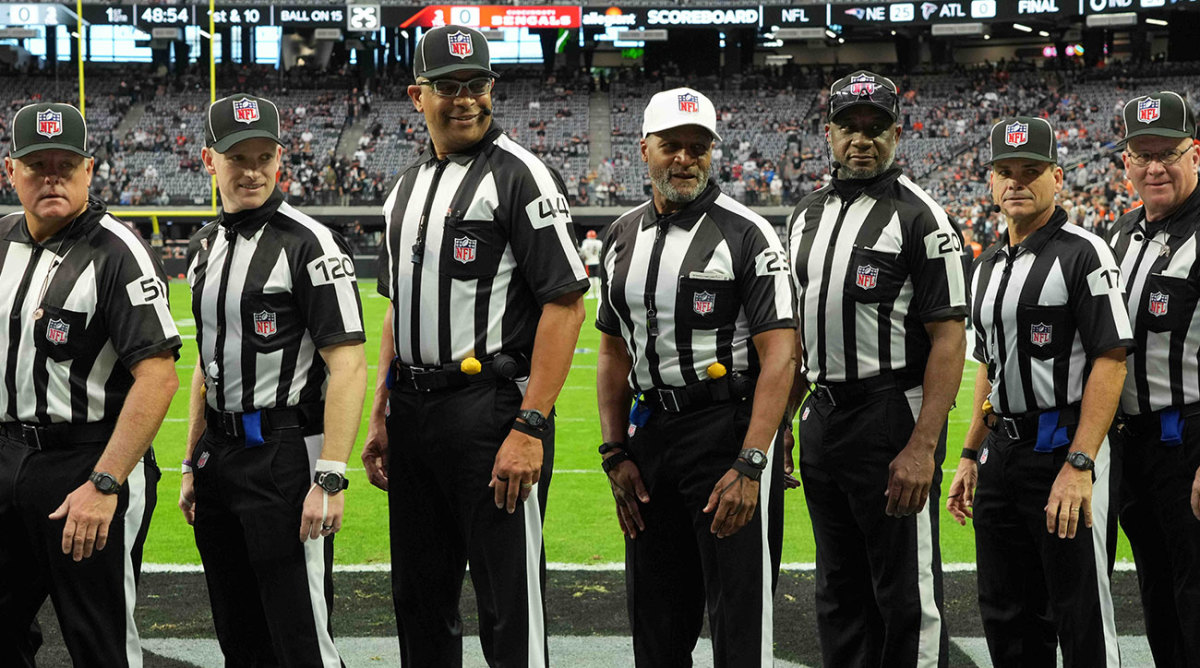
ONE BIG QUESTION
How is COVID-19 affecting … the officials?
My editor extraordinaire Mitch Goldich posed the question to me on Thursday afternoon in passing along this tweet from ESPN NBA insider Adrian Wojnarowski.
ESPN Sources: As the Omicron variant rips through NBA players and coaches, it’s reached a season-high among game officials: 36 percent of the league’s referees are in Covid protocols: https://t.co/Jv5EBSNxWi
— Adrian Wojnarowski (@wojespn) December 30, 2021
So I decided to go do a little digging on this and was able to ascertain that, yes, the pace at which omicron is tearing through the U.S. has caused the NFL concern already on the availability of officials. In fact, the truth is that it’s already taken its toll.
NFL referees are required to take take-home tests every Monday—they spit in a tube, FedEx the sample off to the lab, and then on Tuesday the results of the PCR test come back, which is what clears them for the weekend’s games. And up until Week 12, just three officials had returned positive tests this year. Unfortunately, as has been the case for players of late, and the country as a whole, circumstances have changed in December.
The last rounds of tests, taken on Dec. 20 and 27, have returned 18 positives. Because of those results, two officials who worked last Thursday’s 49ers-Titans game had to come back and fill in on crews on Sunday. And every crew is, as they’ve been trained to be, ready to go with six officials rather than seven (as part of their normal training, they’re taught the mechanics of having to go with a person out), if they lose someone on short notice.
Things could get complicated this weekend and next with games packed on to Sunday, rather than being spread out over the weekend. Week 17 features 15 Sunday games and the Monday nighter. And Week 18 will have two Saturday games and 14 Sunday games. The NFL has 17 crews, so the extra crew does give the league some flexibility. But the idea that a crew or two might be short-handed because moving officials from one location to another will be tougher with so many games happening at once isn’t unrealistic.
So could that be a problem?
Well, I’ve got a pretty funny story on that.
I talked to an official who was a back judge for a Patriots game years ago. In that game, the head referee was injured, so he moved to take the head referee’s place. The way the crew was logistically set up, as a seven-man group, was to have eyes on every receiver on passing plays. But down a man, that became impossible. Bill Belichick soon figured out that the officials weren’t able to keep up with what was happening with his opponent’s tight end.
And you can guess what happened next. The tape, in the aftermath, showed the officials that the New England defense wound up absolutely mugging that tight end. Which is, of course, another pretty good example of Belichick’s taking every edge out there for him.
Which is to say if an official is missing in Foxboro this weekend, you might wanna look for some aggressive coverage from the home team.
• Madden’s Revolutionary Impact, Style Will Never Be Replicated
• MMQB: How the Patriots Push the Bills to Improve
• Bengals Already Better Than in Marvin Lewis Era
• Don't Write Off Trey Lance's Season Yet
